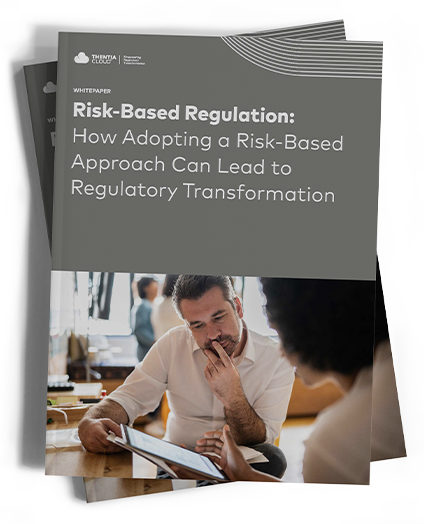Real estate agents and brokers provide invaluable expertise and guidance to clients throughout the long and complicated process of buying or selling a home. But as buying a home is often the biggest purchase people make in their lifetime, and real estate professionals have unsupervised access to their clients’ homes and possessions during the selling process, it’s crucial that these professionals are properly regulated with ethics standards in place to protect the public from possible harm.
Regulatory agencies in real estate share many of the same challenges faced by other professional regulators – such as limited financial resources and staff, having to rely on siloed systems or paper-based processes, and lacking time to focus on regulatory work and strategy – but, as with all licensed professions, they face distinct challenges as well. In this blog, we’ll explore some common challenges of regulating real estate and ways that agencies can overcome them.
Regulating real estate involves innumerable transactions between various stakeholders
Regulating real estate is highly complex, with many stakeholders involved. Some regulators are responsible only for the regulation of real estate salespersons, brokers, and entities, while others also regulate related industries such as real estate appraisal, mortgage brokerage, property inspection, and subdivision development. In addition to licensees, real estate regulators regularly interact with various other stakeholders, including managing brokers, auditors, inspectors, appraisers, CE providers, homeowners’ associations, industry organizations like the Association of Real Estate License Law Officials (ARELLO), and regional MLS databases.
With so many stakeholders involved in day-to-day operations, even seemingly simple transactions such as name changes, license renewals, and tracking continuing education requirements can become complicated and encounter long delays if they have to be completed manually. Communication and information-sharing with external organizations can also be challenging. For example, regulatory agencies regularly report data to ARELLO’s Licensee Verification Database as well as MLS databases, but pulling and submitting the data can be time-consuming for agency staff.
Implementing an all-in-one licensing solution that can streamline and digitize each step of the regulatory process can help regulators remove the bottlenecks that often cause delays. By automating workflows to trigger notifications on action items and approvals, and automating approvals where possible, agencies can offer expedited turnaround times for everything from registration and renewals to complaints, inspections, audits, and appraisals. In addition, by consolidating all pertinent data in one place and integrating with external data sources, an all-in-one licensing solution can make reporting tasks much easier for regulatory staff.
Licensees can change brokerages often
It’s not uncommon for real estate professionals to move brokerages quickly, which can be hard for regulators to keep up with. In most jurisdictions, regulators need to be aware of which firm their licensees work for, but they may not have mechanisms in place to be notified of changes. Also, a change in employer frequently means that the licensee’s primary email address has also changed, so the one on file with the regulator will be out-of-date.
For agencies that rely on spreadsheets or other internal systems to keep track of licensees’ contact information, it is difficult and time-consuming to manually track brokerage and primary contact changes for licensees. But not having the correct information makes it hard to be proactive with communications regarding renewals, which can lead to higher rates of unlicensed activity since licensees might not be aware that their license has lapsed.
Adopting a system that enables online licensing with a user-friendly portal can alleviate these challenges for regulators by allowing licensees to easily update their contact information during the renewal process. Communicating with licensees via text message can also help, as agents typically keep their cell phone numbers when they change brokerages.
Non-resident licensing provides benefits for licensees, but presents challenges to investigations
Several states across the U.S. offer licensing and portability options for non-residents to make it easier for salespeople and brokers to work across state lines. In these states, applicants who are non-residents can have their licensing expedited, but they still must meet requirements and complete the state-specific portion of the licensing exam to ensure they are familiar with that state’s regulations.
Non-resident licensing helps provide mobility and increased earning potential for real estate professionals, which is especially beneficial for those who live in cities located close to state borders, but it also presents several challenges from the regulatory perspective. Although they do have to meet specified licensing requirements, out-of-state brokerages don’t have the same in-depth knowledge of communities and regulations as local brokerages do.
There can be a lack of accountability for these out-of-state brokerages because they’re not as easily accessed for in-person audits and inspections and can also obstruct the complaint and investigation process. In cases where citizens make a complaint against a non-resident real estate professional, the regulator still has an obligation to properly serve the licensee with notice of the complaint and have them participate in the investigation, but an out-of-state licensee can more easily evade the process. In instances where the regulator imposes a fine, collecting it from out-of-state brokerages is also more difficult.
Changing or modifying state laws/statutes to require out-of-state brokerages to designate an in-state registered representative can help regulators overcome investigation and complaint challenges associated with non-resident licensing. They can also implement policies to audit out-of-state offices at regular intervals and/or require audits of new out-of-state brokerages within one year of licensure.
Unlicensed activity can be hard to prevent and detect
There are a few primary ways that unlicensed activity occurs in the real estate sector. In many cases, a licensed salesperson or broker doesn’t realize their license has lapsed and continues practicing. But it can also occur when someone provides services in a jurisdiction where they aren’t licensed, or when an unlicensed real estate assistant carries out activities they aren’t allowed to do under state-specific regulations.
Unlicensed activity can be hard to prevent for regulators because of the aforementioned communication challenges associated with real estate professionals switching brokerages frequently. It can also be hard to detect. It’s the responsibility of managing brokers to ensure the professionals they supervise are up to date on their license renewals, but if they fail to do this, the regulator often won’t find out about unlicensed activity unless another agent finds out an individual is unlicensed during a deal and reports it, or unless an unhappy client files a complaint. For this reason, fostering effective communication with real estate professionals as well as the public regarding unlicensed activity is vital to the investigations process.
For regulatory agencies that use an online licensing system, setting up automated renewal approvals or automated workflows that trigger notifications to licensees and managing brokers of lapsed or soon-to-be lapsed licenses can help prevent unlicensed activity. Having a robust system to manage complaints and investigations can also facilitate better intake and processing of complaints and improve communication between the regulator and complainant.
Technology can help alleviate pain points of regulating real estate
In recent years, more and more regulatory agencies are implementing technological solutions to transform their licensing processes and alleviate many of the pain points of regulating real estate. Next time, we’ll take a look at how Thentia Cloud is empowering real estate regulators to streamline processes, automate routine tasks, and digitize manual paperwork – saving them precious hours, cutting costs, and helping them focus on their important regulatory work.












